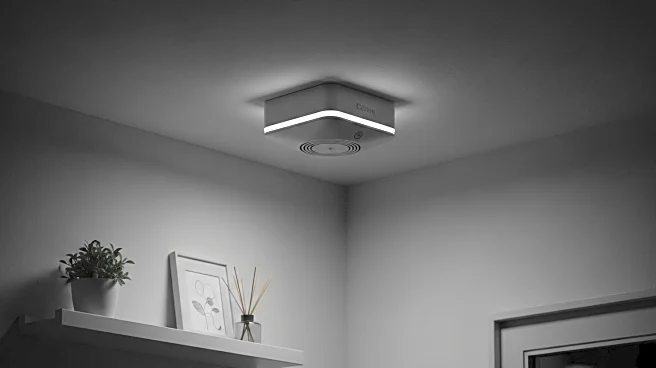What's Happening?
Homeowners often experience the frustrating phenomenon of smoke alarms chirping at night, disrupting sleep and causing concern. This issue is primarily due to temperature fluctuations affecting battery performance. Smoke alarms are designed to alert users when batteries are low, but colder nighttime temperatures can increase battery resistance, triggering the alarm's low battery sensor. This typically occurs between 2 a.m. and 6 a.m., when temperatures are at their lowest. Factors such as the age of the smoke detector, high daytime temperatures, and exposure to direct sunlight can exacerbate the issue. To resolve this, homeowners are advised to replace the smoke alarm batteries, as turning up the thermostat is only a temporary fix.
Why It's Important?
Understanding the cause of nighttime smoke alarm chirping is crucial for homeowners to maintain safety and peace of mind. Smoke alarms are vital for fire safety, and ensuring they function correctly is essential. The nighttime chirping can lead to sleep disturbances, impacting overall health and well-being. By addressing the root cause—battery performance affected by temperature—homeowners can prevent unnecessary alarm activations and ensure their smoke detectors are reliable. This knowledge empowers homeowners to take proactive measures, such as regular battery replacement, to avoid disruptions and maintain effective fire safety systems.
What's Next?
Homeowners may consider upgrading to newer smoke detectors that offer enhanced features, such as voice alerts and app integration. These advanced models provide clearer information about the alarm's status, reducing uncertainty and improving user experience. Companies like Kidde and First Alert have developed alarms that communicate specific issues, such as low battery or the need for replacement, through voice alerts. Additionally, partnerships with smart home apps allow users to receive notifications on their smartphones, even when away from home. These innovations can help prevent nighttime disturbances and ensure smoke alarms function optimally.
Beyond the Headlines
The issue of smoke alarm chirping at night highlights the importance of regular maintenance and technological advancements in home safety devices. As smart home technology evolves, integrating smoke alarms with broader security systems can enhance overall home safety. This development reflects a growing trend towards interconnected home devices that provide comprehensive protection and convenience. The shift towards smarter smoke alarms also underscores the importance of user-friendly interfaces and clear communication in safety devices, ensuring homeowners can easily understand and address potential issues.










